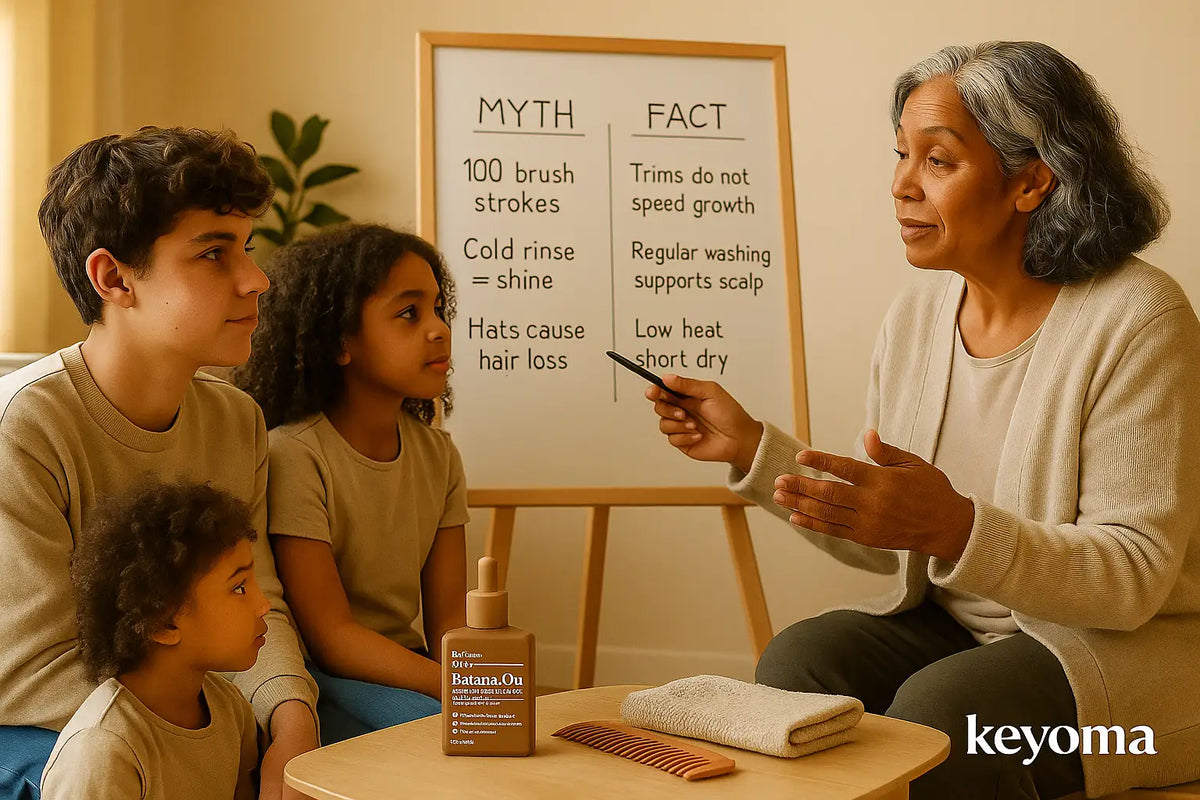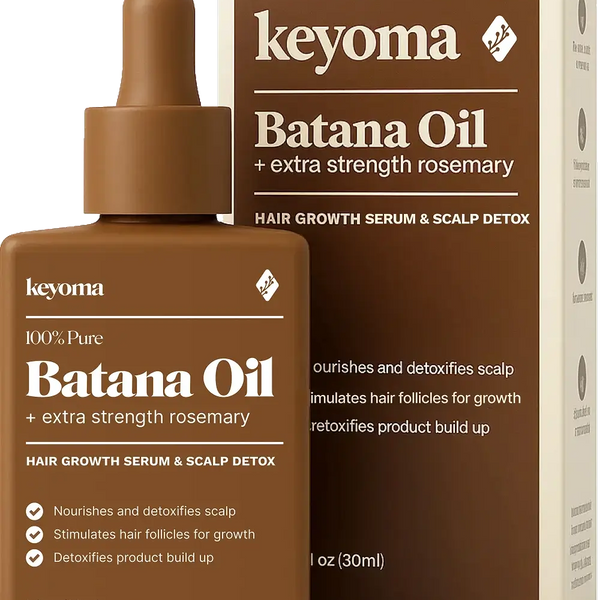In this article
You probably grew up hearing old wives' tales and all kinds of cures for everything. But how much Truth is in these Myths?
From long-standing home remedies to the newest hair care products, the world is crowded with Myths about hair growth. How many of these ideas hold up under scientific review? On my wavy, color-treated hair, a few popular tips didn’t help when I tried them.
Many common hair Myths can do more harm to your hair than you realize. We our committed to giving you facts about hair growth backed by science, so you can make better-informed choices about how to regrow hair.
Whether you want to regrow thinning hair or simply give your strands a healthy boost, here’s what you need to know about hair growth to separate fact from fiction.
Common Hair Growth Misconceptions
Before you try a new tip or toss your shampoo, it helps to sort what actually supports growth from what only sounds helpful. The next section breaks down common hair growth misconceptions and pairs each one with what we know about hair and scalp behavior.

Use it as a quick filter for advice you hear from friends, social media, or even the salon. That way, you can keep the habits that help and skip the ones that waste time.
Trimming and Growth: Truths About Hair Loss and Regrowth
Myth: A good trim helps your hair grow.
Truth: Your hair shaft is made of hardened, keratinized protein, which is not living. The living part is the bulb, nourished by the scalp’s blood supply. Cutting the ends does not affect growth at the follicle, so trimming will not make hair grow longer or faster.
Regular trims keep strands in their best condition and limit split ends. A cut can also give cosmetic lift, making hair look fuller and thicker. A light dusting keeps the ends neat without changing how fast it grows.
Check out these receding hairline haircuts
Daily Washing: Hair Growth Science Explained
Myth: You shouldn't wash your hair every day because it harms your hair.
Truth: Regular washing is not harmful to your hair or scalp; that claim is a Myth. For overall hair and scalp health, we suggest washing every one to two days. That said, some hair types do better with less frequent washes, so you should follow a routine and use products that fit your hair and scalp.
Every other day keeps my scalp comfortable. Regular cleansing creates an ideal setting for hair to grow, maintains scalp health, and stimulates blood and oxygen to the scalp.
Sulfates, Silicones, and Growth: Hair Growth Science Explained
Myth: Avoid shampoos and conditioners with sulphates and silicones because they are bad for hair.
Truth: Sulphates and silicones are not harmful and appear in many good quality products. Sulphates work as cleansing agents that create the lather you feel when shampooing; some hair types benefit from that foam, while others do better without it. Silicones can reduce frizz, smooth the cuticle, and add shine.
Although these ingredients are harmless, their type and strength vary across formulas, so they can affect different hair types differently. Use products suited to your hair and skin, and avoid the idea that any ingredients found in shampoos and conditioners are harmful. A light silicone left fewer flyaways without weighing it down.
Explore how to prevent split ends with natural oils
Air-Dry vs. Blow-Dry: Hair Growth Science Explained
Myth: Air-drying is better for your hair than blow-drying it.
Truth: Surprisingly, this is both true and false. You should avoid blasting your hair with hot air every day, but air-drying daily isn’t ideal either. A recent study found that blow-drying increases damage on the surface, while air-drying can cause more harm inside the strands, which may be worse (shocker, we know).
When hair stays wet for a long time, it swells and puts pressure on the proteins that keep it intact, potentially causing more damage than heat styling. Your best approach?
Use the lowest heat on your dryer (or hold it at least six inches from your hair), and keep the dryer moving so you don’t focus heat on one spot. A short, low-heat dry left the ends smoother than a full air-dry.
Product Switching: Common Hair Growth Misconceptions
Myth: Your hair adapts to the same products, so you need to keep switching them regularly.
Truth: Hair doesn’t “get used to products”; that isn’t how hair works. What changes is your hair and scalp over time, so if you stop getting the same results, it likely means your hair or scalp has shifted.
Chemical services, environmental changes, health, lifestyle, stress, and hormonal fluctuations, to name a few, can all lead to shifts in your hair and scalp. Use products that fit your hair type to keep condition and style at their best.
If a product no longer helps, swap it for one better suited to your needs. Summer humidity made me move to a lighter conditioner. If your products still work for you, there’s no reason to change them.
Hats and Hair Loss: Truths About Hair Loss and Regrowth
Myth: Wearing hats causes hair loss.
Truth: You can still wear your favorite cap. Casual caps didn’t change shedding. Very tight styles (like braids or ponytails), harsh chemical treatments, or hats worn extremely tight for long periods can cause breakage or irritate your scalp. But everyday hat-wearing isn’t to blame.
Check out these hats for balding
Cold Rinses: Debunking Hair Growth Remedies
Myth: A cold water rinse makes hair shine.
Truth: No. Cold water doesn’t seal the hair cuticles or make your hair smoother and shinier on its own; a rinse-out conditioner usually delivers those effects. Although a cool rinse can feel refreshing, it actually narrows the blood capillaries that supply the hair bulb with nutrients and oxygen.
For lasting shine, pick products matched to your hair type, such as conditioners or serums designed to smooth and add gloss. A rich conditioner and a light leave-in gave more sheen than any cold rinse.
Gray Hair and Regrowth: Myths and Facts
Myth: Plucking one gray hair will make more hairs grow back thicker.
Truth: That idea is false and not a way to make hair thicker. Pulling strands from the root can be very damaging, and if you do it often, it can lead to long-term hair loss in the plucked area. A hair coloring service with a professional stylist is a better way to manage gray hairs; root touch-ups worked well.
100 Strokes: Real vs. Fake Hair Growth Methods
Myth: Brushing your hair 100 strokes every day makes it healthier.
Truth: That claim is a Myth; brushing 100 daily strokes offers no hair health benefit. Brushing helps prevent tangles and knots, and it can give your hair a smoother, neater look when strands are tangle free. It does not make your hair healthier.
Overbrushing, using the wrong tools or technique, or brushing when hair is wet and fragile can damage the hair shaft and cuticle scales, leading to permanent breakage. Be careful when you detangle: go gently with a wide tooth comb, working from the ends toward the root, and take your time.
That slow, end-to-root approach kept snaps to a minimum.
Self-Cleaning Hair: Common Hair Growth Misconceptions
Myth: If you skip washing, your hair cleans itself.
Truth: Hair isn’t self-cleaning; that idea is a Myth. When you don’t wash, dirt, dust, grease, dead skin cells, and oil from the sebaceous gland (sebum) build up.
That buildup on the scalp can disrupt the skin’s natural biota, and in some people it leads to an irritated scalp with itching, flaking, and inflammation. stretching washes too long made my scalp feel tight and itchy.
Get Started With Keyoma: Learn Hair Growth Myths and Facts
Common hair growth myths can pull you off course, but a clear head helps you spot what’s worth trying. Treat bold claims as ideas to test, not guarantees, and give changes a fair window before you judge them.
Track what you do, note how your scalp and ends respond, and check in with a licensed pro if shedding, breakage, or irritation keeps up. I saw steadier progress when I focused on simple habits and skipped miracle fixes. Stay curious, patient, and kind to your hair. For more hair care tips, always check the Keyoma blog and collection.
Featured Product
100% Pure Batana Oil + Rosemary









